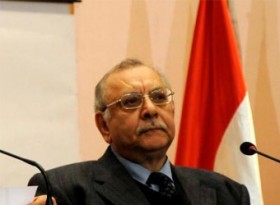Egypt swears in interim president
 The top judge of Egypt's Constitutional Court, Adly Mansour, has been sworn in as interim leader, hours after the army ousted President Mohammed Morsi and put him under house arrest.
The top judge of Egypt's Constitutional Court, Adly Mansour, has been sworn in as interim leader, hours after the army ousted President Mohammed Morsi and put him under house arrest.
Advertisement
Army chief Gen Abdul Fattah al-Sisi announced the move on Wednesday, in what Mr Morsi said was a military coup.
Gen Sisi said Mr Morsi, Egypt's first freely elected leader, had "failed to meet the demands of the people".
The upheaval comes after days of mass rallies against the Islamist president.
Protesters accused Mr Morsi and the Muslim Brotherhood of pursuing an Islamist agenda for the country and of failing to tackle Egypt's economic problems.
The BBC's Kevin Connolly in Cairo says the president had appeared to protesters to be economically out of his depth, and had not given them the reassurances they wanted that he could address rampant poverty.
Some 50 people have died since the latest unrest began on Sunday.
Mr Mansour was appointed chief justice of the Supreme Constitutional Court only four days ago, and was sworn in to that office on Thursday morning.
He was then sworn in as interim head of state.
US concern
Mr Morsi's opponents celebrated through the night in Cairo's Tahrir Square, after the army announced it had suspended the Islamist-backed constitution - approved by a referendum in 2012 - and pledged to hold new elections.
But a number of people were killed as clashes erupted overnight between Morsi supporters and the security forces in Cairo and Alexandria.
Gehad el-Haddad, a spokesman for Mr Morsi's Muslim Brotherhood, told the BBC the ousted leader had been put under house arrest and the "entire presidential team" was in detention.
Mr Haddad's father, senior Morsi aide Essam el-Haddad, and Saad al-Katatni, head of the Brotherhood's political wing, are among those held.
The state-run al-Ahram newspaper reported that arrest warrants had been issued for 300 leaders and members of the Muslim Brotherhood.
US President Barack Obama has said he is "deeply concerned" by the latest turn of events and called for a swift return to civilian rule.
The removal of the president followed four days of mass protests against Mr Morsi and an ultimatum issued by the military, which expired on Wednesday afternoon.
In his televised speech, Gen Sisi said the armed forces could not ignore the call of the Egyptian masses.
He spoke of a new roadmap for the future, and said Mr Mansour would be given the task of "running the country's affairs during the transitional period until the election of a new president".
The army's roadmap for the post-Morsi era includes:
- Suspension of the constitution
- A civilian, transitional technocratic government
- Supreme Constitutional Court to prepare for presidential and parliamentary elections
- A "charter of honour" to be drawn up and followed by national media
Discontent
The army moved quickly after Gen Sisi's speech, with military vehicles seen fanning out across the capital.
TV stations belonging to the Brotherhood went off air and state news agency Mena said managers at the movement's Misr25 channel had been arrested.
A notice on Mr Morsi's Facebook page condemned the "military coup".
The statement asked Egyptian citizens to "abide by the constitution and the law and not to respond to this coup".
Mr Morsi, who had pledged his life to defend constitutional legitimacy, accused the army of "taking only one side".
In Tahrir Square thousands of anti-Morsi protesters celebrated with fireworks and honking car horns.
One protester, Omar Sherif, told AFP news agency: "It's a new historical moment. We got rid of Morsi and the Muslim Brotherhood."
The BBC's Kevin Connolly in Cairo says no-one knows what will happen next. The danger, he says, is that both sides will try to settle differences by bringing supporters on to the streets.
The army has said it will not allow that to happen but, our correspondent says, it will not be easy to stop.
After Gen Sisi's address, both Pope Tawadros II - the head of the Coptic Church - and leading opposition figure Mohammed ElBaradei made short televised speeches about the new roadmap for Egypt's future which they had agreed with the army.
Mr ElBaradei said the roadmap aimed for national reconciliation and represented a fresh start to the January 2011 revolution.
Opposition leader and former Arab League chief Amr Moussa told AFP that consultations for a government and reconciliation "will start from now".
Mr Morsi became Egypt's first Islamist president on 30 June 2012, after winning an election considered free and fair following the 2011 revolution that toppled Hosni Mubarak.
However his term in office was marred by constant political unrest and a sinking economy.
The mass protests at the weekend that led to the army's intervention were called by the Tamarod (Rebel) movement, in response to worsening social and economic conditions.
But there has been a growing sense of discontent since last November, when Mr Morsi issued a controversial constitutional declaration granting himself extensive powers.
His moves to entrench Islamic laws and concentrate power in the hands of the Muslim Brotherhood also alienated liberals and secularists.
Source: BBC